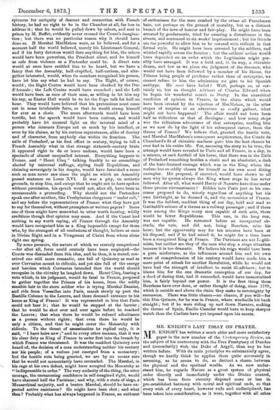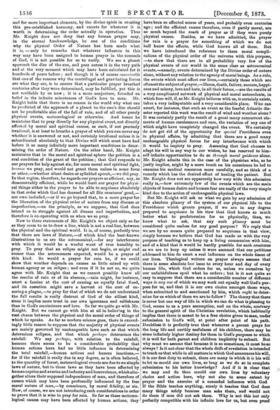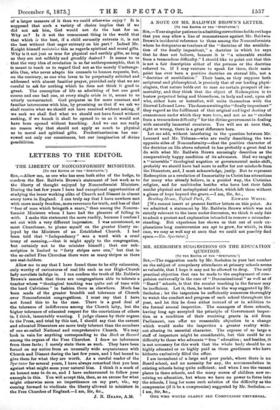MR. KNIGHT'S LAST ESSAY ON PRAYER.
MR. KNIGHT has written a much abler and more satisfactory paper in the new number of the Contemporary Review, on the subject of his controversy with the Free Presbytery of Dundee and (secondarily) with the Duke of Argyll, than any he has written before. With its main principles we substantially agree, though we hardly think he applies them quite accurately in assuming, as he seems to do, BO distinct a chasm between the physical and the spiritual worlds. As we now under- stand him, he regards Nature as a great system of physical order directly and immediately under the Divine control, which has been from eternity disposed more or leas in pre-established harmony with moral and spiritual ends, so that every wish of every heart, however rude and undisciplined, has been taken into consideration, as it were, together with all other and far more important elements, by the divine spirit in creating this pre-established harmony, and counts for whatever it is worth in determining the order actually in operation. Thus Mr. Knight does not deny that any human prayer may, in the eternal foreknowledge, be one of the conditions why the physical Order of Nature has been made what it is, — only he remarks that whatever influence in this way may have been assigned to human prayer in the counsels of God, it is not possible for us to verify. We see a planet approach the disc of the sun, and pass across it in the very path and at the very moment which may have been calculated for it hundreds of years before ; and though it is of course conceivable that one of the reasons why the centrifugal and gravitating forces are what they are, is to ensure that a particular prayer breathed centuries after they were determined, may be fulfilled, yet this is not verifiable by us now ; it is a mere conjecture, founded on belief in the infinite minuteness of God's love to man. Mr. Knight holds that there is no reason in the world why what can be predicted of the approach of a planet to the sun's disc should not be predictable also of the fall of rain, and of all other purely physical events, meteorological or otherwise. And hence he maintains that to pray directly for any physical event, not directly affected by moral and spiritual causes, as such, if not precisely irrational, is at least to breathe a prayer of which you can never say whether it is answered or not, and certainly irrational unless it is subordinated absolutely to that Divine will which must have bad before it so many infinitely more important conditions in deter- mining the order of Nature. On the other hand, Mr. Knight maintains that in the moral and spiritual sphere the petition is a real condition of the grant of the petition ; that God responds to our prayers for help against sin, for more moral and spiritual light, because we pray, and would not grant them unless in some form or other,—whether silent desire or syllabled speech,—we did pray. In that region, therefore, he regards our prayers as efficient, nay, as demonstrably efficient, while he would limit our prayer for physi- cal things either to the prayer to be able to acquiesce absolutely in that order which God has decreed for all His creatures' good,— our own included,—or if we go beyond that, to a mere prayer for the liberation of the physical order of nature from any disease or imperfection,—on the principle, as we suppose, that God does intend us to struggle against all disease and imperfection, and therefore is co-operating with us when we so pray.
Now to these statements of Mr. Knight's we object only so far as they seem to us to draw a line, which is not a real line, between the physical and the spiritual world. It is, of course, perfectly true that there are laws of Nature,—of which kind the best-known illustrations to us are the astronomical,—for any interference with which it would be a woeful want of true humility to pray. To pray that an eclipse might not begin, or might end sooner than the astronomers expected, would be a prayer of this kind. So would a prayer for rain be, if we could show that weather depends on causes as little mixed up with human agency as an eclipse ; and even if it be not so, we quite agree with Mr. Knight that as we cannot possibly know all the results of rain or of its absence,—rain might, for instance, avert a famine at the cost of causing an equally fatal flood, and its cessation might save a harvest at the cost of en- suring a plague,—to pray for that of which we do not understand the full results is really distrust of God of the silliest kind, since it implies more trust in our own ignorance and selfishness than in God's omniscience and love. So far we quite go with Mr. Knight. But we cannot go with him at all in believing in the vast chasm between the physical and the moral order of things of which he speaks. As far as modern science goes, there is exceed- ingly little reason to suppose that the majority of physical events are mainly governed by unchangeable laws such as that which determines eclipses, and that which perhaps determines the rainfall. We say perhaps, with relation to the rainfall, because there seems to be a considerable probability that human actions have had no little influence in determining the total rainfall,—human actions and human inactions,— for if the rainfall is really due in any degree, as is often believed, to the quantity of forest, meteorological events are due to no simple laws of nature, but to those laws as they have been affected by human caprice and avarice and industry and benevolence, which alto- gether alters their supposed independence of man, and therefore of causes which may have been profoundly influenced by the free moral nature of man,—by conscience, by moral fidelity, or sin. Now, of course, we are not introducing such considerations in order to prove that it is wise to pray for rain. So far as these meteoro- logical causes may have been affected by human actions, they have been so affected scores of years, and probably even centuries ago ; and the efficient causes therefore, even if partly moral, are as much beyond the reach of prayer as if they were purely physical causes. Besides, as we have admitted, the prayer for rain is a prayer for something of which we do not half know the effects, while God knows all of them. But we have introduced the reference to these moral compli- cations of the physical order of the universe with this purpose, —to show that there are in all probability very few of the physical events of our world in the same class as astronomical events,—namely, events determined by the Divine order of nature alone, without any relation to the agency of moral beings. As a rule, the events which most affect our lives,—certainly those which are of tenest the subject of prayer,—illness, death, failure, success, happi- ness and misery, love and hate, in all their forms,—are the results of a very complicated network of physical and moral antecedents, in which free-will, if, as Mr. Knight believes with us, it certainly exists, takes a very indisputable and a very considerable place. Who can assert, for instance, that such an event as the fearful Atlantic dis- aster reported this week was the result of wind and weather alone ? It was certainly partly the result of a great many concurrent ele- ments of human carelessness and care, the variation of any one of which might have completely changed the event. We certainly do not get rid of the opportunity for special Providence even in physical affairs, by admitting that there are a good many unchangeable physical forces for any interference with which it would be impiety to pray. Assuming that God chooses to adapt his will in any way to our wishes, he has reserved to him- self infinite opportunities to do so through moral guidance alone. Mr. Knight admits this in the case of the physician who, as he justly implies, might by a mere touch on his conscience be led to examine his medical resources more carefully, and so think of a remedy which has the desired effect of healing the patient. But Mr. Knight does not see apparently how very wide this admission really is,—how extremely few of the events which are the main objects of human desire and human fear are really of the very simple kind due to the action of unchangeable physical laws.
But Mr. Knight will ask us what we gain by any admission of this absolute pliancy of the system of our physical life to the Providence which grants prayer, if we are in any degree prepared to acquiesce in his view that God knows so much better what to predetermine for us physically, than, we know what to ask, that any such pliancy must be considered quite useless for any good purpose? We reply that we are by no means quite prepared to acquiesce in that view, simply because we believe that God has made us with the very purpose of teaching us to keep up a living communion with him, and of a kind that it would be hardly possible for such creatures as we are to keep up unless it were assumed that our petitions addressed to him do exert a real influence on the whole tissue of our lives. Theological writers on prayer always assume that there is some absolute best issue to every hour and day of every human life, which God orders for us, unless we ourselves by our unfaithfulness spoil what he orders ; but is it not quite as easy to suppose that there are a considerable number of different ways in any one of which we may work out equally well God's pur- pose for us, and that it is our own choice amongst those ways, when submitted to and sanctioned by him, which ought to deter- mine for us which of them we are to follow ? The theory that there is never but one way of life in which we can do what is pleasing to God, seems to us a pure assumption, and on the whole, contrary to the general spirit of the Christian revelation, which habitually implies that there is meant to be a free choice given to man, under submission to God's will, at point after point of his path. Doubtless it is perfectly true that whenever a parent prays for the long life and earthly usefulness of his children, there may be sOn3e infinitely higher destiny for them in God's purposes to which it is well for both parent and children implicitly to submit. But why must we assume that because it is so sometimes, it must beso always ? Is it not clear that the whole drift of revelation is intended to teach us that while in all matters in which God announces his will, it is our first duty to submit, there are many in which it is his will to let us mould our own lives, so long as we do so in complete submission to his better knowledge? And if it is clear that we may and do thus mould our own lives by voluntary choice and action here, why not also to some extent by prayer and the exercise of a conceded influence with God If the Bible teaches anything, surely it teaches that God does many things solely because man asks them, and would not do them if men did not ask them. Why is not this not only perfectly compatible with his infinite love for us, but even proof
of a larger measure of it than we could otherwise enjoy ? It is supposed that such a variety of choice implies that if we did not ask him, God would not do the beat for us. Why so ? Is it not the commonest thing in the world that that which is the best, if a child earnestly entreats it, is not the best without that eager entreaty on his part ? Indeed Mr. Knight himself maintains this as regards spiritual and moral gifts. Why is it not just as true for physical and earthly gifts, so long as they are not selfishly and greedily desired ? It seems to us . that the very idea of revelation is so far anthropomorphic, that it is meant to teach us to regard God not as the merely Unchange- able One, who never adapts his counsels to human requests, but, on the contrary, as one who loves to be perpetually solicited and addressed with almost familiar prayer, provided only that we are careful to ask for nothing which he does not think it good to grant. The conception of life as admitting of but one good course and one bad one, at every single crisis in it, seems to us utterly unwarranted. God prepares us for more constant and familiar intercourse with him, by promising us that if we ask we shall receive what we should not have received without asking, if we seek we shall find what we should not have found without seeking, if we knock it shall be opened to us as it would not have been opened without knocking. And we can see really co reason why that should not apply as much to physical as to moral and spiritual gifts. Predestinarianism has nar- rowed not only our consciences, but our imagination of divine possibilities.








































 Previous page
Previous page